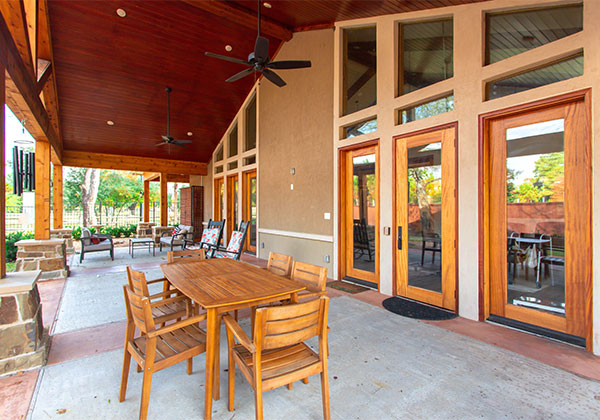
Dementia is a progressive condition affecting memory, thinking, and behavior. For those with dementia, maintaining purpose and a sense of belonging is vital for emotional and cognitive well-being.
Memory care in The Woodlands or elsewhere offers more than medical support—they provide nurturing environments with meaningful activities that enhance quality of life and preserve identity.
Activities like music therapy, arts, and social interactions help improve cognitive and emotional health, fostering comfort, joy, and connection.
Below are ten ways these activities at dementia-assisted living facilities enrich the lives of seniors with dementia.
Fostering Emotional Connections
Memory impairments often lead to isolation and frustration, as individuals struggle to recall familiar faces and experiences. Meaningful activities, especially those involving family and social interactions, help foster emotional connections.
Regular socialization through group activities encourages community, reducing loneliness and depression while promoting positive emotions.
Engaging Through Music Therapy
Music therapy has been shown to have profound effects on individuals with dementia. The familiar melodies of songs from their past often evoke memories, stimulate cognitive function, and enhance mood.
Singing, listening to music, or playing instruments can trigger emotional responses, allowing seniors to reconnect with their emotions and share in joyful experiences. Music can also encourage physical movement and social interaction.
Encouraging Creativity Through Art
Creative hobbies such as painting, drawing, and crafting give individuals with dementia the opportunity to express themselves non-verbally.
These activities promote cognitive function by stimulating the brain’s creative centers, helping to reduce agitation and stress.
Additionally, art therapy allows individuals to feel proud of their accomplishments, which can build confidence and a sense of achievement.
Improving Physical Health with Exercise
Dementia-assisted living communities often incorporate gentle physical activities, such as walking or chair yoga, to improve the physical health of residents.
Exercise helps maintain motor skills, increases mobility, and reduces the risk of other health complications. It also stimulates the release of endorphins, which can improve mood and reduce anxiety.
Promoting Cognitive Stimulation
Cognitive exercises, such as puzzles, memory games, and trivia, stimulate the brain and help maintain cognitive abilities. These activities challenge the brain in a fun and engaging way, slowing the progression of cognitive decline.
Even small tasks, like sorting objects or identifying shapes and colors, promote mental engagement and provide a sense of accomplishment.
Maintaining Routines for Comfort
Maintaining familiar routines and activities helps reduce anxiety for individuals with dementia. Predictable schedules create a sense of stability and security, minimizing confusion or agitation.
Many dementia-assisted living facilities provide daily activities that are familiar to residents, such as group exercises, art projects, or communal meals, which reinforce a comforting sense of structure.
Fostering Independence and Autonomy
Even as memory declines, seniors still benefit from opportunities to make choices and express preferences. Whether choosing a favorite hobby or selecting a preferred meal, having control over daily life fosters autonomy.
Activities tailored to individual abilities can promote self-esteem and ensure seniors feel valued and respected.
Stimulating the Senses
Sensory stimulation is a key part of dementia care. Engaging activities such as gardening, cooking, or interacting with pets provide sensory input that can have calming effects.
Touch, smell, taste, and sight are important for helping seniors feel more connected to the present moment, reducing disorientation and helping them remain engaged with the world around them.
Nurturing a Sense of Purpose
Seniors with dementia often experience a loss of purpose, leading to frustration and feelings of worthlessness. Individuals can regain a sense of purpose by participating in meaningful activities, such as setting the table, folding laundry, or helping in the kitchen.
This can promote a positive sense of self and encourage active participation in daily life, allowing them to feel that they contribute to the community.
Creating Lasting Memories
While memory loss is a hallmark of dementia, engaging in special moments or activities can help create lasting impressions.
Though a person may not retain long-term memories, the emotional experiences associated with joyful activities can leave a lasting impact.
Activities like celebrating birthdays, participating in holiday traditions, or enjoying a shared meal can create emotional memories that enhance the quality of life.
The End Note
Memory care in The Woodlands or elsewhere emphasizes holistic care, offering diverse activities that promote physical, emotional, and cognitive well-being for seniors with dementia. These activities help keep residents active, connected, and purposeful.
When choosing memory care in The Woodlands, families should seek communities that provide excellent medical care alongside a supportive, enriching environment. Tailored activities ensure individuals with dementia retain dignity and a high quality of life.